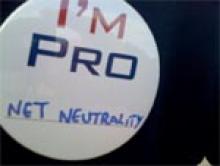After winning the election, the Obama Administration announced that broadband networks would be a priority. True to its word, the stimulus package included $7.2 billion to expand networks throughout the United States. A key question was how that money would be spent: Would the public interest prevail, or would we continue having a handful of private companies maximizing profits at the expense of communities?
Creating the Broadband Stimulus Language
The debate began in Congress as the House and Senate drafted broadband plans as part of the American Recovery and Reinvestment Act
The House language on eligibility for stimulus grants made little distinction between global, private entities and local public or non-profit entities.
the term `eligible entity' means--
(A) a provider of wireless voice service, advanced wireless broadband service, basic broadband service, or advanced broadband service, including a satellite carrier that provides any such service;
(B) a State or unit of local government, or agency or instrumentality thereof, that is or intends to be a provider of any such service; and
(C) any other entity, including construction companies, tower companies, backhaul companies, or other service providers, that the NTIA authorizes by rule to participate in the programs under this section, if such other entity is required to provide access to the supported infrastructure on a neutral, reasonable basis to maximize use;
The Senate language clearly preferred non-profit or public ownership.
To be eligible for a grant under the program an applicant shall—
(A) be a State or political subdivision thereof, a nonprofit foundation, corporation, institution or association, Indian tribe, Native Hawaiian organization, or other non-governmental entity in partnership with a State or political subdivision thereof, Indian tribe, or Native Hawaiian organization if the Assistant Secretary determines the partnership consistent with the purposes this section
The final language, adopted by the Conference Committee and passed by both houses in February was a compromise. It favored a public or non-profit corporation but allowed a private company to be eligible only if the Assistant Secretary of the Department of Commerce found that to be in the public interest.




